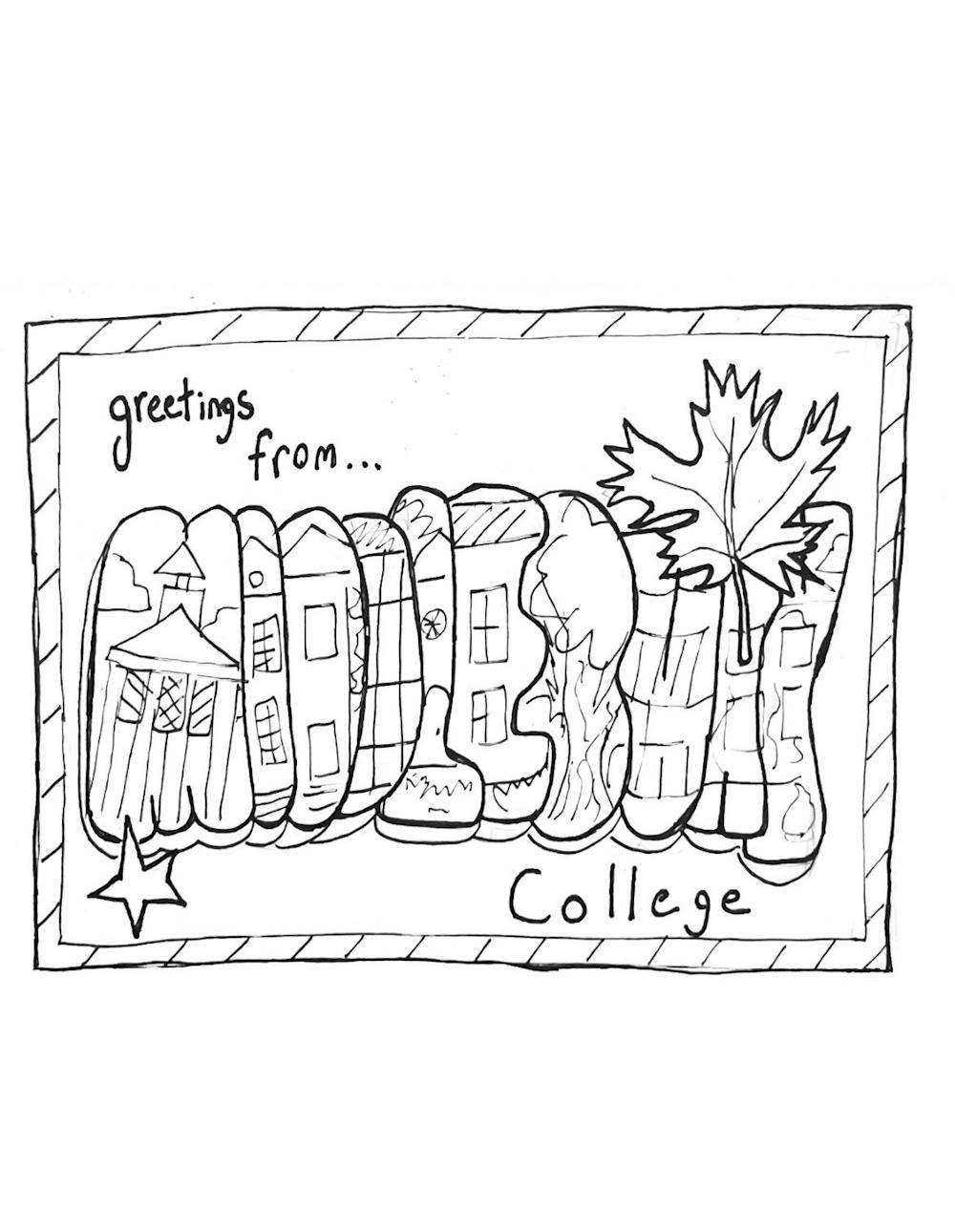My suitemate Vlera’s entire life can be viewed through the river of postcards that run down her wall. Ask her about the 4”x6” print from the Musee d’Orsay in Paris, and you’ll get an earful about her six-month-long battle with the common cold. Comment on her somewhat kitschy collection from Banff National Park, and she’ll recall the days she was so tired of hearing English at boarding school that she refused to speak anything but Albanian.
Each year, her walls become more claustrophobic. Scrawled notes from roommates and cellophane tape clog any remaining white space. She tells time this way: adding another card every few months. I envy the linearity of the story her collage tells, for it disregards the unremarkable. Most of my days blend together, lacking the discernable purpose and distinction of a postcard-worthy event.
I hang no pictures in my room, only uninterpretable Ernst and Bosch paintings. I keep the postcards Vlera has gifted me in a shoe box, along with Christmas cards from my mother and a silver gelatin print of my two best friends, Atticus and Dylan.
If someone were to ask me to describe my Middlebury experience, I would inevitably talk about my friends. I can’t keep track of the readings I’ve done, but I can see myself petering along the trusses of a railway bridge with Atticus and Dylan. I can see our legs swing over the water, hear globs of spit arc, whistle and thwack.
We are all an average of those we spend time with, repeaters of pilfered phrases and cooks of replicated meals. I’ve spent my first three years here with Atticus and Dylan, and in this way, the man I’ve become at Middlebury is thanks to them. I didn’t need postcards to remind me of who I was becoming because the causes of my many neuroses stood before me, draped like modern Pietá’s in ripped band t-shirts and handicraft haircuts.
This semester, I’ve found myself missing our Middlebury. Dylan is now in New York, getting his Masters, and Atticus is at Oxford, doing his worst Kerouac impression. I am still here, grabbing tea at Ross and fishing dinks out of the Middlebury River, but recently, I couldn’t help but feel like my time at this school had ended. With three semesters left, I began obsessively planning my escape earlier this fall. I applied for almost one hundred jobs, looked into seeing if my extra high school credits could speed me past “Go,” and get me out of a place where I increasingly felt like a visitor. I was caught in the liminal space between my Middlebury and what I thought to be the beginning of life: a Chelsea studio with an Ikea bed frame and exactly one fork, spoon and knife.
I must admit, I am not entirely out of this space. I feel the pull of Plato’s cave every day. Yet, I have begun a new project. With the help of old friends like Vlera and some new ones, I aim to craft for myself a second coming of Middlebury. I am, at heart, a utilitarian, but my need to connect every action to some greater good often overwhelms me. I’m having to learn on the fly to trust that things naturally turn out okay for most Middlebury students. Regardless of intent, my time here must mean something more than the white space between postcards.
I’ve tried befriending new people with moderate success. As it turns out, it's never too late. A new friend, Griffin, tears me from my battered copy of “All the Pretty Horses” for night walks filled with debates on political theory. We pass trees I climbed with Dylan and talk about music I first listened to with Atticus. I treasure my friendship with Griffin and our anti-Trotskyist trots to the Knoll. Still, I can't help wishing Atticus and Dylan were here with me. But I can live with that.
Edvard Munch painted the same subjects hundreds of times, unable to excise ghosts from his palette. Many seniors perform a similar exercise, stitching new patterns onto familiar memorial canvases. Each rendition becomes less exciting. The parties are “dead,” and the rumors that the butter chicken at Tindia cures a hangover have been disproved via randomized control trial. As we symbolically tread water, we may have an urge to abandon our current reality for something new and exciting. I don’t want to discourage that: Munch’s most famous piece“The Scream,” was only a series of five. However, while we are still here, we must strive to find joy in our traditions and repetitions. Another Munch masterpiece, “The Kiss,” is a reimagination of a centuries-old motif. This is all to say we still have time to make new memories and friends, and extract some purpose from our time, even if the pinnacle of our Middlebury experience is behind us. Perhaps I am naive, but with 2,800 students and 800 courses in the catalog, we need to look for love beyond past flings, friends beyond our suites and classes in departments unimportant to a Goldman interviewer. The things that give us meaning, either through pulling us closer to a goal or by helping us self-actualize, are fleeting.
Every generation has its Shakespeare; every man their Hamlet; every student their Middlebury. Don’t be too quick to concretize what this place means to you. It may slip away.




